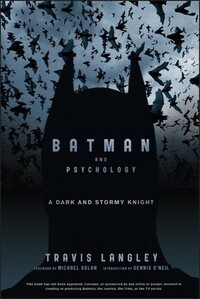Take a photo of a barcode or cover
Apart from being enthralled by The Dark Knight when I went to see it at the cinema in 2008, the Arkham video games are probably what got me most interested in Batman and the rich criminological world he lives in. There is a part in one of the games when Mad Hatter is running around looking for 'Alice', which got me really intrigued by the psychology behind Gotham's villains. It seemed to be there is so much to explore here that I briefly considered dedicating my Criminology degree dissertation to the topic. I found this book instead and I've finally got around to reading it.
Initially, I was hoping for exploration of individual villains, and that is in here, but mostly as relatively short sections at the end of each themed chapter. I was kind of disappointed by this at first, but actually I really appreciate it now. This book starts with psychological themes we can recognise in the Batman stories first and then applies these in an investigative and illuminating way to the world of Batman and Gotham's villains. The exploration is very much grounded in real life clinical psychology and criminality. While offering a richer understanding of Gotham, it also offers an entirely fascinating insight into real life criminality and criminal justice systems. I think this book is exactly the way to approach the idea of exploring ideas like crime and psychology through fiction.
I also got more than I asked for. As well as this investigation into Gotham's villains, Trevor Langley explores, in great detail, Bruce Wayne's character, through developmental psychology, and his relationships, through the theories of attachment styles - as well as more. I found that this book would work really well as an engaging introduction to psychology.
I was slightly disappointed that 'The women' chapter turned out to just be about female characters in terms of their relationships to Batman as girlfriends, but throughout the book there is a hint of deeper investigation into female characters like Harley Quinn, Poison Ivy and Catwoman. And in general, Trevor Langley's tone is relatable, inclusive and down to earth.
Initially, I was hoping for exploration of individual villains, and that is in here, but mostly as relatively short sections at the end of each themed chapter. I was kind of disappointed by this at first, but actually I really appreciate it now. This book starts with psychological themes we can recognise in the Batman stories first and then applies these in an investigative and illuminating way to the world of Batman and Gotham's villains. The exploration is very much grounded in real life clinical psychology and criminality. While offering a richer understanding of Gotham, it also offers an entirely fascinating insight into real life criminality and criminal justice systems. I think this book is exactly the way to approach the idea of exploring ideas like crime and psychology through fiction.
I also got more than I asked for. As well as this investigation into Gotham's villains, Trevor Langley explores, in great detail, Bruce Wayne's character, through developmental psychology, and his relationships, through the theories of attachment styles - as well as more. I found that this book would work really well as an engaging introduction to psychology.
I was slightly disappointed that 'The women' chapter turned out to just be about female characters in terms of their relationships to Batman as girlfriends, but throughout the book there is a hint of deeper investigation into female characters like Harley Quinn, Poison Ivy and Catwoman. And in general, Trevor Langley's tone is relatable, inclusive and down to earth.
Okay, I simply adored this; it's delightful, funny and yet, filled with science and facts for those who enjoy psychology.
Me? I love both, Batman and psychology, so this was tailor-made for me *laughs* And it's obvious that the author truly loves Batman, too. And he knows his comics. And his movies. And TV shows. *dies laughing*
There are a lot of psychological profiles on Batman's different versions, on his adversaries and even on us, the fans that will give you a new vision on these characters.
Look, if you are a Batman fan, you can't miss this. Just... go and get this book, you won't regret it.
Me? I love both, Batman and psychology, so this was tailor-made for me *laughs* And it's obvious that the author truly loves Batman, too. And he knows his comics. And his movies. And TV shows. *dies laughing*
There are a lot of psychological profiles on Batman's different versions, on his adversaries and even on us, the fans that will give you a new vision on these characters.
Look, if you are a Batman fan, you can't miss this. Just... go and get this book, you won't regret it.
informative
medium-paced
slow-paced
At first, I was really skeptical about this book, especially its concept. Serious psychological analysis of Batman, for real? I mean I like Bats as much as the other guy but isn`t this too much? Last year I reread Alan Moore`s Watchmen and overall spent an unhealthy amount of time thinking about superheroes and among the other things about how seriously to take them. My consensus at the moment is this: superheroes are escapist and entertainment fiction. Don`t get me wrong, I`m not a snob, I`m well aware of the fact that comics are not for kids for a while now and there`re still place for deep and well-written stories, but after all, this is still about men in tights fighting crime and stopping alien invasions. If the story about Superman is deep and philosophical it`s great but there`s nothing wrong if it`s just fun.
Nevertheless, I find myself hooked into this book right from the start.
The author answers the popular questions about the characters and debunks some common misconceptions like Batman`s PTSD or Two-Face`s multiple personality disorder (which apparently isn`t a thing) and many others. It`s a deep and well-research analysis, Travis Langley goes through different versions and years of the timeline in order to present his arguments. It`s always interesting to learn something new about your favorite characters and to look at them from a different angle.
It`s not just a remarkably well-written analysis of Batman`s character and mythology, but also a really good book about psychology for the general audience. There`re always references not only to comic books but to scientific publications about a specific topic. It, of course, works better if you already familiar with the characters presented here as an example of specific psychological phenomena and disorders. I learn a lot reading this book and find myself taking notes. A lot of notes actually. So much for not taking superheroes too seriously.
The thing is, we can always learn from fiction, especially good fiction. Batman comic books have been published for the last 80 years and of course, there`re a lot of great stories. Batman itself is one of the most complex characters in popular culture, he has one of the best rogues galleries, all of which present infinite possibilities for intriguing plots and personal conflicts. A good story is a pleasure by itself. Sometimes authors have something more in mind, sometimes don`t. You shouldn`t have a degree in psychology in order to enjoy your story. But if you want to go one step further in order to understand and appreciate all complexity that Batman story can represent, something like Batman and Psychology would be really helpful.
Nevertheless, I find myself hooked into this book right from the start.
The author answers the popular questions about the characters and debunks some common misconceptions like Batman`s PTSD or Two-Face`s multiple personality disorder (which apparently isn`t a thing) and many others. It`s a deep and well-research analysis, Travis Langley goes through different versions and years of the timeline in order to present his arguments. It`s always interesting to learn something new about your favorite characters and to look at them from a different angle.
It`s not just a remarkably well-written analysis of Batman`s character and mythology, but also a really good book about psychology for the general audience. There`re always references not only to comic books but to scientific publications about a specific topic. It, of course, works better if you already familiar with the characters presented here as an example of specific psychological phenomena and disorders. I learn a lot reading this book and find myself taking notes. A lot of notes actually. So much for not taking superheroes too seriously.
The thing is, we can always learn from fiction, especially good fiction. Batman comic books have been published for the last 80 years and of course, there`re a lot of great stories. Batman itself is one of the most complex characters in popular culture, he has one of the best rogues galleries, all of which present infinite possibilities for intriguing plots and personal conflicts. A good story is a pleasure by itself. Sometimes authors have something more in mind, sometimes don`t. You shouldn`t have a degree in psychology in order to enjoy your story. But if you want to go one step further in order to understand and appreciate all complexity that Batman story can represent, something like Batman and Psychology would be really helpful.
informative
medium-paced
informative
reflective
medium-paced
This is a sort of psychology 101 by diep diving into Batman and it is great. The book is a bit outdated as it is a bit older, but I would still recommend it if you like Batman and want to know more about psychology.
Love psychology and Batman so this book was a treat to learn from and understand the psychology of major characters from a much more specific and technical standpoint.
I know this probably makes me a gigantic nerd but I found this book fascinating!





